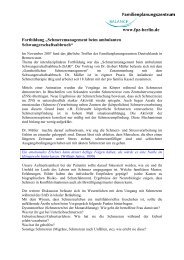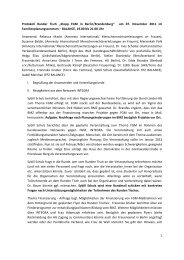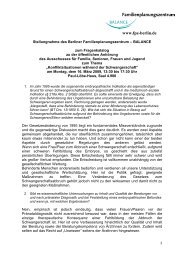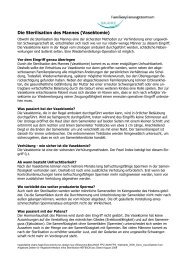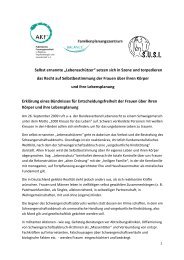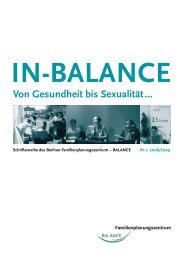Listening to African Voices - FPZ
Listening to African Voices - FPZ
Listening to African Voices - FPZ
You also want an ePaper? Increase the reach of your titles
YUMPU automatically turns print PDFs into web optimized ePapers that Google loves.
Over 90% of the participants affirmed that FGM/C wastaking part in their ethnic group and 72% reported that thepractice was part of their family’s tradition.“It is our tradition that a female should be circumcisedlike boys on the eighth day. Since we had it done in ourinfancy, we don’t know whether it is painful or not. Butthere are regions where girls are circumcised at a laterage. But thank God we went through the experiencewhile we were infants.” (three women of Ethiopian originduring a focus group discussion)5.5.9.3. Women and girls concernedOf the 35 women interviewed, 19 claimed <strong>to</strong> have undergoneFGM/C. All of them had been subjected <strong>to</strong> the practiceduring infancy in Ethiopia. The practice was carried out bytraditional practitioners although one woman was not sureand reported that it might have taken place in a hospital.Two women chose not <strong>to</strong> give information on their statusand in one case the interviewer preferred not <strong>to</strong> ask if thewoman had undergone FGM/C. The remaining 13 womensaid that they had not been subjected <strong>to</strong> the practice.Less than a third (31%) of the participants claimed <strong>to</strong> haveone or more daughter(s). The <strong>to</strong>tal number of daughters(younger than 20 years) within the interviewed sample was28; 21 of the girls are living in Germany.According <strong>to</strong> the parents, none of the girls living in Hamburghad undergone FGM/C. None of the parents had theintention of subjecting their daughters <strong>to</strong> the practice in thefuture. There was only one parent, a father of two daughters,who refused <strong>to</strong> answer the question whether or not heintended <strong>to</strong> have his daughters undergo FGM/C.“It is our culture. But as <strong>to</strong> the question [do you intend <strong>to</strong>have your daughters circumcised?], the answer is no! Wedon’t do it here. Why should we? We are living in a countrywhere female circumcision is not practiced and thereis no cultural infl uence or pressure <strong>to</strong> do so. [….] it is not agood culture and the girl may regret it when she becomesan adult.” (five women during a focus group discussion)“It is difficult <strong>to</strong> think that a family living in Hamburgmight be in favour of female circumcision. It would nothave any meaning <strong>to</strong> have your daughter circumcised.Becoming married is not connected <strong>to</strong> women beingcircumcised.” (woman, key informant of Ethiopian origin)“I have never ever heard of an Ethiopian family whopracticed it here or when going back home. I think theremight be some women out there who went through thepractice in their childhood back home years before theycame here. But I don’t think that there are practitioners,as most of them are educated or from urban areas.” (man,key informant of Ethiopian origin)5.5.9.4. Perceptions related <strong>to</strong> the practiceAll participants of Ethiopian origin had already heard aboutFGM/C and for most of them it was a practice withoutany benefit. About 35%, however, associated one or moreadvantages with the practice. There were more women(43%) who thought of FGM/C as an advantageous practicethan men (28%). The most frequently perceived benefits ofFGM/C were that• it is a practice which improves hygiene and cleanliness,• it increases the social acceptance of a girl/woman and herfamily and that• it reduces the sexual desire of a woman.The latter aspect was significantly more often named bywomen (17%) than men (5%).“There are equal hygiene benefits for both men andwomen when the woman is circumcised. Circumcisionhelps <strong>to</strong> prevent the woman’s cli<strong>to</strong>ris from growing solong that it blocks the passage during sex so it is better<strong>to</strong> cut early. Female circumcision also prevents complicationsduring birth and prevents pain during intercoursefor virgins. Women’s sexual organs are internal and theyare unclean and smell when not cut. A woman should becut in order <strong>to</strong> be clean and acceptable in the church. Iknow it is painful but the benefits of tradition and religioncannot be overlooked.” (man of Ethiopian origin married<strong>to</strong> a German)5.5.9.5. FGM/C and religionOne woman and five men believed that FGM/C was an obligationof their religion. Five of them were Christians and onea practitioner of a traditional religion. They mentioned thatthe Orthodox Church in Ethiopia recommends the FGM/C ofgirls and the circumcision of boys at the age of eight days.“I have three circumcised sisters. They were circumcisedat infancy according <strong>to</strong> the religion of the OrthodoxChurch in Ethiopia”. (40-year-old man of Ethiopian originmarried <strong>to</strong> a German)The large majority of participants perceive FGM/C as acultural cus<strong>to</strong>m as described in the following paragraph by aChristian religious leader of the Ethiopian community.<strong>Listening</strong> <strong>to</strong> <strong>African</strong> <strong>Voices</strong> 67






